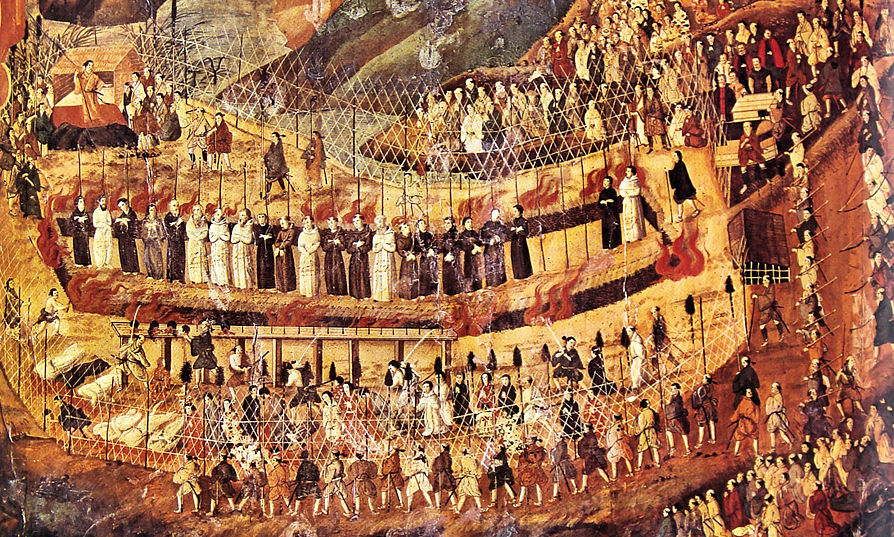Editor’s note: This post was originally published on February 6, 2015. Fr. Bonaventure Chapman was ordained to the priesthood in May 2017 and now serves as the assistant chaplain and adjunct professor of philosophy at Providence College for the Dominican Province of St. Joseph.
Thanks to secularization, modern people easily forget the true meaning of Christian words. Take, for instance, the saints we celebrate today: St. Paul Miki and his companions were martyred in 1597 on the outskirts of Nagasaki, Japan. A witness to the execution records St. Paul Miki’s final sermon:
As I come to this supreme moment of my life, I am sure none of you would suppose I want to deceive you. And so I tell you plainly: there is no way to be saved except the Christian way. My religion teaches me to pardon my enemies and all who have offended me. I do gladly pardon the Emperor and all who have sought my death. I beg them to seek baptism and be Christians themselves.
Saint Paul Miki, a martyr for the faith; and yet I find many people don’t understand what martyrdom is about. Perhaps you have had this experience, but on a number of occasions people have asked me why Christian martyrdom is okay but Islamic fundamentalist suicide bombing is not. “They are both about dying for faith,” one hears. Leaving aside for now the issue of Islamic fundamentalists, this is a good time to reflect on why Christian martyrdom is not really about death.
Saint Thomas follows the classical tradition in classifying actions according to their object, or end. So the act of eating is about food, the act of reading is about words on a page, the act of shooting is about hitting a target. Ends are essential in the definition of the act. Now, this doesn’t mean that circumstances are unimportant; it just means they are extrinsic to the act itself. So, for instance, the act of reading is essentially the same whether one reads a book, magazine, computer screen, billboard, etc. The circumstances can add moral qualifications to the action (shooting skeet with a bazooka is morally different when it is done in the middle of a country field rather than at a busy airport), but the essence of the act remains the same. Make sense? Good.
What is the essential act of martyrdom? What is its end? Here’s the point: it is not death. The martyr does not seek death as the end or object of his or her act. That is called suicide, no matter how noble the cause. The martyr would be just as happy not dying because of a confession of faith. Witness Peter and John in Acts 5, first being let out of prison by an angel and then rejoicing after only a slight beating upon recapture. They were ready to die for the faith (and Peter eventually would), but they didn’t stay in jail in the hopes of death, nor did they leave the Sadducees downcast because they only received a good drubbing. They had preached and witnessed to Christ; that was the essential part.
Saint Thomas highlights this aspect in his discussion of martyrdom in the Summa Theologiae: “Martyrdom consists essentially in standing firmly to truth and justice against the assaults of persecution” (ST II-II, q. 124, a. 1, corpus). Martyrdom, for St. Thomas, is a special act of fortitude, a “standing firm” in the face of death. But death is not the goal. St. Thomas explains: “endurance of death is not praiseworthy in itself, but only in so far as it is directed to some good consisting in an act of virtue, such as faith or the love of God” (ST II-II, q. 124, a. 3, corpus). Now, of course, death is rightly associated with martyrdom, wherein the Christian’s virtuous “endurance” is rendered in the most perfect fashion. St. Thomas explains: “A martyr is so called as being a witness to the Christian faith, which teaches us to despise things visible for the sake of things invisible… therefore the perfect notion of martyrdom requires that a man suffer death for Christ’s sake” (ST II-II, q. 124, a. 4, corpus).
A martyr is one who dies not for death’s sake, but for Christ’s sake, which makes all the difference in the world. Fr. Romanus Cessario, O.P., explains: “Theological faith provides the specific adherence that distinguishes Christian martyrdom from political assassination or dying for an ideological cause.” There is a certain passivity in the martyr, which is absent in the suicide bomber: something akin to the passivity of Christ on the cross. The martyr suffers death; he does not seek it.
This understanding of martyrdom raises two important points. First, every Christian should have a bit of martyr in him or her, at least by way of similitude. Whenever we are called to witness to the difference Christ makes in our lives – in word or deed, and in the face of opposition – we can, like St. Paul Miki and his Companions, ask for the gift of fortitude, in whatever dose we need for the situation. Second, this brings a new seriousness to any act of witness. One of the crucial theological debates of the early Church was what to do with Christians who failed to witness to the faith during persecution. The early Church took witnessing to Christ seriously, even if it did not always end in death. Do you?
✠







